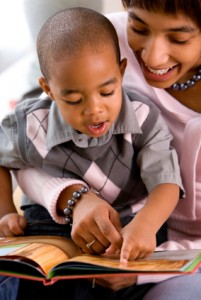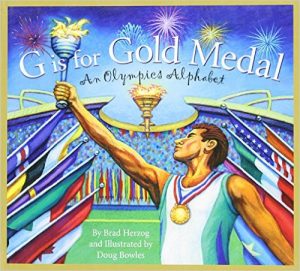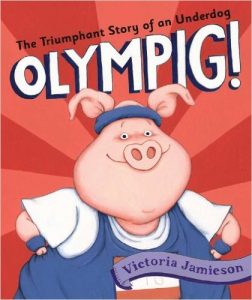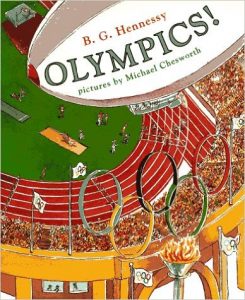 One way to get in the spirit of the Games is to share children’s books about the Olympics and win a medal for reading-well, listening to adults read.
One way to get in the spirit of the Games is to share children’s books about the Olympics and win a medal for reading-well, listening to adults read.
Kids ask questions and while we watch the Games, they will want to know why. There are lots of books for older kids, but not many for the preschool crowd.
 G is for Gold Medal: An Olympics Alphabet has 2 sections of text for each letter. One part is shorter, rhyming text for younger listeners and the other part is more detailed paragraphs for more advanced readers. There’s lots of information in the text and in the illustrations.
G is for Gold Medal: An Olympics Alphabet has 2 sections of text for each letter. One part is shorter, rhyming text for younger listeners and the other part is more detailed paragraphs for more advanced readers. There’s lots of information in the text and in the illustrations.
 Olympig by Victoria Jamieson is quite unexpected. Boomer, the pig, enters many of the events at the Olympics. His performance doesn’t match his expectations and he keeps losing. He keeps trying though. After several losses, his discouragement mounts and he quits in frustration. His mother isn’t embarrassed; she’s proud of him for trying. Boomer tries again and this time has a much different reaction even if it’s the same result.
Olympig by Victoria Jamieson is quite unexpected. Boomer, the pig, enters many of the events at the Olympics. His performance doesn’t match his expectations and he keeps losing. He keeps trying though. After several losses, his discouragement mounts and he quits in frustration. His mother isn’t embarrassed; she’s proud of him for trying. Boomer tries again and this time has a much different reaction even if it’s the same result.
 One of the children’s books about the Olympics with lots of answers and pictures is no longer in print but you might be able to find it at the library. B.G. Hennessy uses simple text in most of the book, Olympics, such as “Runners are running. Jumpers are jumping. Throwers are throwing. Swimmers are swimming laps.” Unfortunately, it’s not an easy book to find.
One of the children’s books about the Olympics with lots of answers and pictures is no longer in print but you might be able to find it at the library. B.G. Hennessy uses simple text in most of the book, Olympics, such as “Runners are running. Jumpers are jumping. Throwers are throwing. Swimmers are swimming laps.” Unfortunately, it’s not an easy book to find.
Whether you read these particular books or not, isn’t important. What matters is reading. Does your child have an interest in a particular sport or activity? Look for a book about that to share with your child. Following is a previous post about having your very own Reading Olympics:
One of the most powerful activities that you can do at home to help develop your child’s kindergarten readiness is to read books and share stories. How about a Reading Olympics? Each day set aside a few minutes to either read to your child or tell a story. To earn a gold medal, read 3 times every day. A silver medal is two books or stories and a bronze would be one book a day.
To make a medal, a juice can lid is just about the right size. Trace around it on some paper and let your child use paint or crayons to color it. Sometimes grownup hands need to help with the cutting. You can decide if there’s a medal for each day that you read, or just one for the week.
Reading encourages all kinds of brain connections for using language and thinking. Children who have been read to at home will have an astonishing total of about 5000 books by the time they start school. That sounds impossible but 3 books a day is more than one thousand in a year. Just think of how those few minutes a day can add up to a tremendous amount of brain stimulation for a child. Can you and your child have some gold-medal fun and learning?

